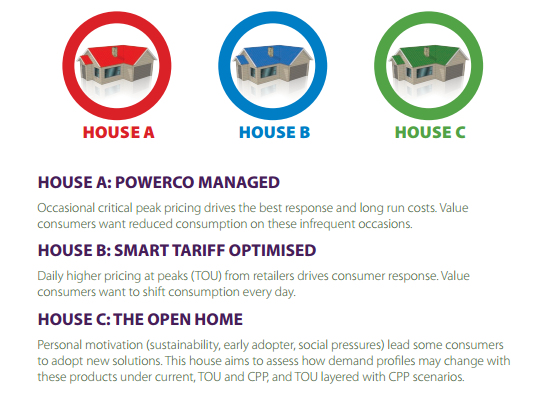
Background information
Powerco’s two-year Smart House Programme will provide specific case studies from three real life situations. Homes in Tauranga, New Plymouth and Wellington have been selected to participate in the trial.
The houses have been fitted with a mix of solar panels, insulation, space and water heating, monitoring and controlling systems, energy efficient lighting and energy storage.

- HOUSE A: POWERCO MANAGED
Occasional critical peak pricing drives the best response and long run costs. Value consumers want reduced consumption on these infrequent occasions - HOUSE B: SMART TARIFF OPTIMISED
Daily higher pricing at peaks (TOU) from retailers drives consumer response. Value consumers want to shift consumption every day. - HOUSE C: THE OPEN HOME
Personal motivation (sustainability, early adopter, social pressures) lead some consumers to adopt new solutions. This house aims to assess how demand profiles may change with these products under current, TOU and CPP, and TOU layered with CPP scenarios.
The trial is focused on the following areas:
Peak load
Significant investment is needed to ensure networks can cope with peak loads, which are typically in the mornings and evenings on the coldest days. Moving electricity use out of these time slots could reduce these costs and associated consumer bills.
There is a potential to reduce peak loads by energy substitution (gas) or demand management such as pre-heating well insulated homes before peak times. Smart technology, solar panels and energy storage may also play a part in reducing peak loads, as may higher tariffs for peak use and lower tariffs off peak.
Smart technology
Smart technology provides the ability for household appliances, heating and hot water systems to be turned on and off automatically at specified times or controlled remotely through the internet. Trialing this technology will help us understand what value it can add. For example, saving consumers money by using their energy at low demand times.
Behavioural changes
The trial will look at what motivates consumers to shift their peak electricity use. This could be more comfort, clever gadgets, an increased awareness of energy consumption, or different price structures.
Solar panels
Solar panels are attracting growing public interest. Factors such as the size and angle of the PV, sun exposure and home energy use can impact on the effectiveness of solar panels. The trial aims to see if there are areas we can investigate to provide value-added services to go with solar power.
The three trial homes have all been fitted with solar panels, with differing roof angles. This will help to show which positions and angles for panels provide the best match for different home energy use (or environments).
Back-up energy storage
Powerco and the Wellington City Council are working together to find out if back-up energy storage systems are able supply power to individual homes when the electricity network is down. For example, if the power goes out after an earthquake or storm.
| What's in homes | Assessing |
|---|---|
| Remotely controlled infra-red heating | Control (load shifting), comfort and heat retention, Smart thermostat. |
| Remote controlled radiator/ "storage" | Control (load shifting), comfort and heat retention, Smart thermostat. |
| Remotely controlled heat pump | Control (load shifting), comfort (& efficiency to old heating) and heat retention. |
| Gas fire heating | Substitution, comfort and heat retention. |
| Gas central heating/water | Substitution, comfort and heat retention. Smart thermostat. |
| Insulation & down-lights | Alternate thermal envelopes. |
| Alternate PV set up | Micro inverters and array set ups (direction, tilt). |
| Solar controller | PV self use; protect, promote ripple connections. |
| Bathroom heat/fans | Timer based control to minimise peak over-run |
| Baseline testing | Multiple old heating sources to benchmark. |
| Fridge/freezer/laundry | White goods not available but opportunity to manage. |
| Energy storage | Peak effect on selected loads (18:00 on; 2kWh). Resilience (4kWh). Model optimal P, small ESU, demand &gas. |
| Cooking options | Efficient cooker, gas cooker, slow cooker. |
IEA Demand-Side Management (DSM)
Task 24 Phase I – Closing the Loop: Behaviour Change in DSM – From Theory to Practice
This Task focuses on the complexities of human energy-using behaviour, looking at the individual, societal and whole-system perspective of energy use. Many global experts participate and help unravel these complexities in order to access the large end-user behaviour change potential for DSM programmes (estimated to be in the range of >30%). Once the ‘loop’ between different ‘Behaviour Changers’ (researchers, funders, policymakers, DSM implementers, and energy end users) is closed will this potential be more likely to be realised in practice.